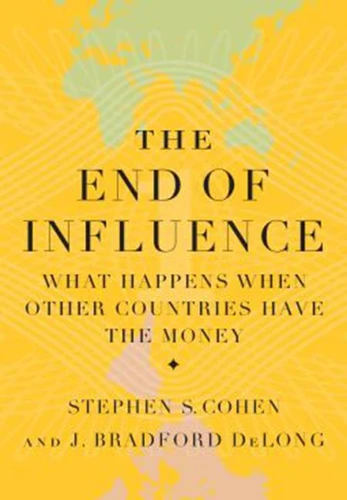The End of Influence. What Happens When Other Countries Have the Money
Par : ,Formats :
Disponible dans votre compte client Decitre ou Furet du Nord dès validation de votre commande. Le format ePub protégé est :
- Compatible avec une lecture sur My Vivlio (smartphone, tablette, ordinateur)
- Compatible avec une lecture sur liseuses Vivlio
- Pour les liseuses autres que Vivlio, vous devez utiliser le logiciel Adobe Digital Edition. Non compatible avec la lecture sur les liseuses Kindle, Remarkable et Sony
- Non compatible avec un achat hors France métropolitaine
 , qui est-ce ?
, qui est-ce ?Notre partenaire de plateforme de lecture numérique où vous retrouverez l'ensemble de vos ebooks gratuitement
Pour en savoir plus sur nos ebooks, consultez notre aide en ligne ici
- Nombre de pages176
- FormatePub
- ISBN978-0-465-02007-2
- EAN9780465020072
- Date de parution04/01/2010
- Protection num.Adobe DRM
- Infos supplémentairesepub
- ÉditeurBasic Books
Résumé
At the end of World War II, the United States had all the money -- and all the power. Now, America finds itself cash poor, and to a great extent power follows money. In The End of Influence, renowned economic analysts Stephen S. Cohen and J. Bradford DeLong explore the grave consequences this loss will have for America's place in the world. America, Cohen and DeLong argue, will no longer be the world's hyperpower.
It will no longer wield soft cultural power or dictate a monolithic foreign policy. More damaging, though, is the blow to the world's ability to innovate economically, financially, and politically. Cohen and DeLong also explore American's complicated relationship with China, the misunderstood role of sovereign wealth funds, and the return of state-led capitalism. An essential read for anyone interested in how global economics and finance interact with national policy, The End of Influence explains the far-reaching and potentially long-lasting but little-noted consequences of our great fiscal crisis.
It will no longer wield soft cultural power or dictate a monolithic foreign policy. More damaging, though, is the blow to the world's ability to innovate economically, financially, and politically. Cohen and DeLong also explore American's complicated relationship with China, the misunderstood role of sovereign wealth funds, and the return of state-led capitalism. An essential read for anyone interested in how global economics and finance interact with national policy, The End of Influence explains the far-reaching and potentially long-lasting but little-noted consequences of our great fiscal crisis.
At the end of World War II, the United States had all the money -- and all the power. Now, America finds itself cash poor, and to a great extent power follows money. In The End of Influence, renowned economic analysts Stephen S. Cohen and J. Bradford DeLong explore the grave consequences this loss will have for America's place in the world. America, Cohen and DeLong argue, will no longer be the world's hyperpower.
It will no longer wield soft cultural power or dictate a monolithic foreign policy. More damaging, though, is the blow to the world's ability to innovate economically, financially, and politically. Cohen and DeLong also explore American's complicated relationship with China, the misunderstood role of sovereign wealth funds, and the return of state-led capitalism. An essential read for anyone interested in how global economics and finance interact with national policy, The End of Influence explains the far-reaching and potentially long-lasting but little-noted consequences of our great fiscal crisis.
It will no longer wield soft cultural power or dictate a monolithic foreign policy. More damaging, though, is the blow to the world's ability to innovate economically, financially, and politically. Cohen and DeLong also explore American's complicated relationship with China, the misunderstood role of sovereign wealth funds, and the return of state-led capitalism. An essential read for anyone interested in how global economics and finance interact with national policy, The End of Influence explains the far-reaching and potentially long-lasting but little-noted consequences of our great fiscal crisis.



